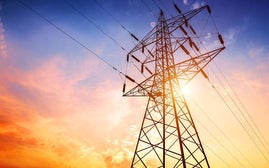Mass. Utilities To Pay $24.8M Over '11 Storm Responses
National Grid will pay $18.7 million, NStar will pay $4 million and Western Massachusetts Electric $2 million in penalties assessed for the response of those companies to storm-induced power outages in 2011.
The penalties - plans for payment are due within 30 days - were announced at a press conference in Boston Tuesday morning by Energy and Environmental Affairs Secretary Rick Sullivan and state Department of Public Utilities commissioners.
Patrick administration officials said the penalties, levied in connection with responses to Tropical Storm Irene and an October 2011 snowstorm, will be returned to utility customers.
DPU officials concluded that "all of the utilities failed in their public safety obligation when it came to responding to local public safety officials regarding downed wires."
The DPU found "systematic failures" in National Grid's preparations for the storms and the company's response to the storms and ordered a third party audit of National Grid's capacity to respond to emergencies.
NStar "performed reasonably" in many respects in response to the storms but "in many instances the company took far too long to respond to priority calls from public safety officials regarding downed wires and did a poor job of communicating with customers," according to the Patrick administration.
The DPU found Western Massachusetts Electric, whose customers were not hit hard by Irene, managed its response to the October snowstorm "well" but ordered the company to improve communications with life-support customers who rely on electricity to meet their medical needs.
"The DPU understands that there will be many thousands of outages in bad storms like Tropical Storm Irene and the October snowstorm. These will not be the last severe storms we see, and the public cannot expect that the utilities can prevent outages in events of this magnitude," DPU Chair Ann Berwick said in a statement. "On the other hand, public safety will remain our absolutely highest priority, and we will not tolerate inadequate responses to local public safety officials. Additionally, in this day and age, we expect competent communications with towns and customers alike."
NStar Electric said it intends to appeal the ruling, saying it was one of the first investor-owned utilities to restore power to customers in both storms and was able to send 76 line workers to assist National Grid and Western Massachusetts Electric in the wake of the October 2011 snowstorm.
"We strongly disagree with the department and are disappointed that they have dismissed the tireless effort put forth by our employees to respond to customers after these historic storms," said Werner Schweiger, president of NStar Electric. "The amount of devastation our system sustained last fall cannot be understated – with an estimated 80 percent of our overheard circuits damaged after Irene alone. We were essentially rebuilding the electric system as we restored power, and the penalties assessed today are simply not in line with the realities of getting the job done."
Meanwhile, National Grid said it has not reviewed the DPU order, but added in a statement: “We understand customers were frustrated by the outages resulting from the devastating storms in 2011 and we share that frustration. We have implemented many changes to our emergency planning and put these into practice during Hurricane Sandy and the November nor’easter.
The utility, which serves much of Central Massachusetts, said it welcomes the opportunity to review its emergency response procedures to improve service to customers during emergency events “and will work closely with the DPU” in that review process.
The DPU also announced Tuesday that it's undertaking an investigation into modernizing the electric grid, reviewing utilities' service quality and service quality standards, undertaking a rule-making process to implement new emergency response and vegetation management provisions laid out in a law approved this year, and reviewing the utilities' existing emergency response plans, as well as the department's own emergency response guidelines.
(Rick Saia of the WBJ staff contributed to this report.)












0 Comments